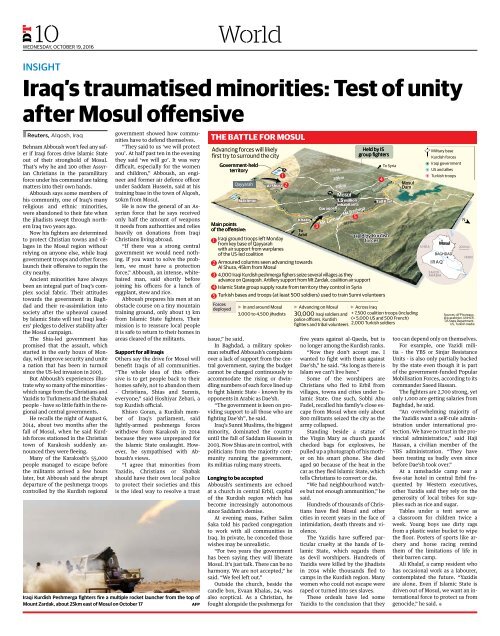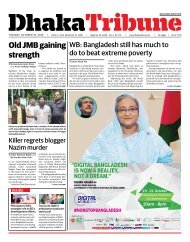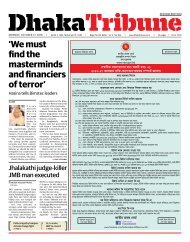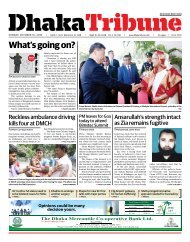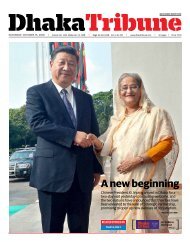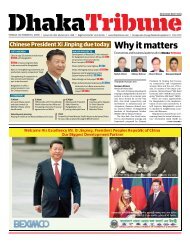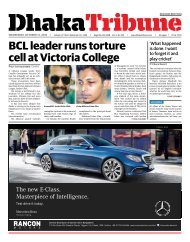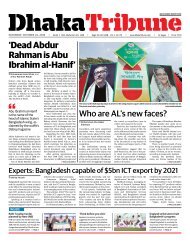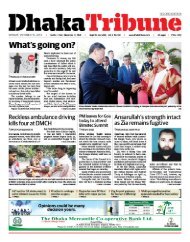ePaper_2nd Edition_October 19, 2016
Create successful ePaper yourself
Turn your PDF publications into a flip-book with our unique Google optimized e-Paper software.
10<br />
WEDNESDAY, OCTOBER <strong>19</strong>, <strong>2016</strong><br />
DT<br />
World<br />
INSIGHT<br />
Iraq’s traumatised minorities: Test of unity<br />
after Mosul offensive<br />
• Reuters, Alqosh, Iraq<br />
Behnam Abboush won’t feel any safer<br />
if Iraqi forces drive Islamic State<br />
out of their stronghold of Mosul.<br />
That’s why he and 300 other Assyrian<br />
Christians in the paramilitary<br />
force under his command are taking<br />
matters into their own hands.<br />
Abboush says some members of<br />
his community, one of Iraq’s many<br />
religious and ethnic minorities,<br />
were abandoned to their fate when<br />
the jihadists swept through northern<br />
Iraq two years ago.<br />
Now his fighters are determined<br />
to protect Christian towns and villages<br />
in the Mosul region without<br />
relying on anyone else, while Iraqi<br />
government troops and other forces<br />
launch their offensive to regain the<br />
city nearby.<br />
Ancient minorities have always<br />
been an integral part of Iraq’s complex<br />
social fabric. Their attitudes<br />
towards the government in Baghdad<br />
and their re-assimilation into<br />
society after the upheaval caused<br />
by Islamic State will test Iraqi leaders’<br />
pledges to deliver stability after<br />
the Mosul campaign.<br />
The Shia-led government has<br />
promised that the assault, which<br />
started in the early hours of Monday,<br />
will improve security and unite<br />
a nation that has been in turmoil<br />
since the US-led invasion in 2003.<br />
But Abboush’s experiences illustrate<br />
why so many of the minorities -<br />
which range from the Christians and<br />
Yazidis to Turkmens and the Shabak<br />
people - have so little faith in the regional<br />
and central governments.<br />
He recalls the night of August 6,<br />
2014, about two months after the<br />
fall of Mosul, when he said Kurdish<br />
forces stationed in the Christian<br />
town of Karakosh suddenly announced<br />
they were fleeing.<br />
Many of the Karakosh’s 55,000<br />
people managed to escape before<br />
the militants arrived a few hours<br />
later, but Abboush said the abrupt<br />
departure of the peshmerga troops<br />
controlled by the Kurdish regional<br />
government showed how communities<br />
have to defend themselves.<br />
“They said to us ‘we will protect<br />
you’. At half past ten in the evening<br />
they said ‘we will go’. It was very<br />
difficult, especially for the women<br />
and children,” Abboush, an engineer<br />
and former air defence officer<br />
under Saddam Hussein, said at his<br />
training base in the town of Alqosh,<br />
50km from Mosul.<br />
He is now the general of an Assyrian<br />
force that he says received<br />
only half the amount of weapons<br />
it needs from authorities and relies<br />
heavily on donations from Iraqi<br />
Christians living abroad.<br />
“If there was a strong central<br />
government we would need nothing.<br />
If you want to solve the problem,<br />
we must have a protection<br />
force,” Abboush, an intense, whitehaired<br />
man, said shortly before<br />
joining his officers for a lunch of<br />
eggplant, stew and rice.<br />
Abboush prepares his men at an<br />
obstacle course on a tiny mountain<br />
training ground, only about 13 km<br />
from Islamic State fighters. Their<br />
mission is to reassure local people<br />
it is safe to return to their homes in<br />
areas cleared of the militants.<br />
Support for all Iraqis<br />
Others say the drive for Mosul will<br />
benefit Iraqis of all communities.<br />
“The whole idea of this offensive<br />
is to get people back to their<br />
homes safely, not to abandon them<br />
– Christians, Shias and Sunnis,<br />
everyone,” said Hoshiyar Zebari, a<br />
top Kurdish official.<br />
Khisro Goran, a Kurdish member<br />
of Iraq’s parliament, said<br />
lightly-armed peshmerga forces<br />
withdrew from Karakosh in 2014<br />
because they were unprepared for<br />
the Islamic State onslaught. However,<br />
he sympathised with Abboush’s<br />
views.<br />
“I agree that minorities from<br />
Yazidis, Christians or Shabak<br />
should have their own local police<br />
to protect their societies and this<br />
is the ideal way to resolve a trust<br />
Iraqi Kurdish Peshmerga fighters fire a multiple rocket launcher from the top of<br />
Mount Zardak, about 25km east of Mosul on <strong>October</strong> 17<br />
AFP<br />
THE BATTLE FOR MOSUL<br />
Advancing forces will likely<br />
first try to surround the city<br />
Qayyarah<br />
Main points<br />
of the offensive:<br />
1<br />
Government-held<br />
territory<br />
Makhmur<br />
Iraqi ground troops left Monday<br />
from key base of Qayyarah<br />
with air support from warplanes<br />
of the US-led coalition<br />
issue,” he said.<br />
In Baghdad, a military spokesman<br />
rebuffed Abboush’s complaints<br />
over a lack of support from the central<br />
government, saying the budget<br />
cannot be changed continuously to<br />
accommodate the rising or dwindling<br />
numbers of each force lined up<br />
to fight Islamic State - known by its<br />
opponents in Arabic as Dae’sh.<br />
“The government is keen on providing<br />
support to all those who are<br />
fighting Dae’sh”, he said.<br />
Iraq’s Sunni Muslims, the biggest<br />
minority, dominated the country<br />
until the fall of Saddam Hussein in<br />
2003. Now Shias are in control, with<br />
politicians from the majority community<br />
running the government,<br />
its militias ruling many streets.<br />
Longing to be accepted<br />
Abboush’s sentiments are echoed<br />
at a church in central Erbil, capital<br />
of the Kurdish region which has<br />
become increasingly autonomous<br />
since Saddam’s demise.<br />
At evening mass, Father Salim<br />
Saka told his packed congregation<br />
to work with all communities in<br />
Iraq. In private, he conceded those<br />
wishes may be unrealistic.<br />
“For two years the government<br />
has been saying they will liberate<br />
Mosul. It’s just talk. There can be no<br />
harmony. We are not accepted,” he<br />
said. “We feel left out.”<br />
Outside the church, beside the<br />
candle box, Evaan Khalas, 24, was<br />
also sceptical. As a Christian, he<br />
fought alongside the peshmerga for<br />
1<br />
2<br />
To<br />
Arbil<br />
30km<br />
20km<br />
Mt Zardak<br />
10km<br />
Mosul<br />
Mt Bashiqa<br />
Held by IS<br />
group fighters<br />
2 Armoured columns seen advancing towards<br />
Al Shura, 45km from Mosul<br />
3 4,000 Iraqi Kurdish peshmerga fighers seize several villages as they<br />
advance on Qaraqosh. Artillery support from Mt Zardak, coalition air support<br />
4 Islamic State group supply route from territory they control in Syria<br />
5 Turkish bases and troops (at least 500 soldiers) used to train Sunni volunteers<br />
Forces<br />
deployed<br />
Al Shura<br />
In and around Mosul<br />
3,000 to 4,500 jihadists<br />
Khazir<br />
3<br />
1.5 million<br />
inhabitants<br />
Qaraqosh<br />
Advancing on Mosul<br />
30,000 Iraqi soldiers and<br />
police officers, Kurdish<br />
fighters and tribal volunteers<br />
five years against al-Qaeda, but is<br />
no longer among the Kurdish ranks.<br />
“Now they don’t accept me. I<br />
wanted to fight with them against<br />
Dae’sh,” he said. “As long as there is<br />
Islam we can’t live here.”<br />
Some of the worshipers are<br />
Christians who fled to Erbil from<br />
villages, towns and cities under Islamic<br />
State. One such, Sobhi Abu<br />
Fadel, recalled his family’s close escape<br />
from Mosul when only about<br />
800 militants seized the city as the<br />
army collapsed.<br />
Standing beside a statue of<br />
the Virgin Mary as church guards<br />
checked bags for explosives, he<br />
pulled up a photograph of his mother<br />
on his smart phone. She died<br />
aged 90 because of the heat in the<br />
car as they fled Islamic State, which<br />
tells Christians to convert or die.<br />
“We had neighbourhood watches<br />
but not enough ammunition,” he<br />
said.<br />
Hundreds of thousands of Christians<br />
have fled Mosul and other<br />
cities in recent years in the face of<br />
intimidation, death threats and violence.<br />
The Yazidis have suffered particular<br />
cruelty at the hands of Islamic<br />
State, which regards them<br />
as devil worshipers. Hundreds of<br />
Yazidis were killed by the jihadists<br />
in 2014 while thousands fled to<br />
camps in the Kurdish region. Many<br />
women who could not escape were<br />
raped or turned into sex slaves.<br />
These ordeals have led some<br />
Yazidis to the conclusion that they<br />
5<br />
4<br />
To Syria<br />
Tall Kayf<br />
Held by Kurdish<br />
forces<br />
Mosul<br />
Dam<br />
Across Iraq<br />
+ 7,500 coalition troops (including<br />
(+ 5,000 US and 500 French)<br />
2,000 Turkish soldiers<br />
SYRIA<br />
Military base<br />
Kurdish forces<br />
Iraqi government<br />
US and allies<br />
Turkish troops<br />
BAGHDAD<br />
IRAQ<br />
SAUDI<br />
ARABIA<br />
Mosul<br />
too can depend only on themselves.<br />
For example, one Yazidi militia<br />
- the YBS or Sinjar Resistance<br />
Units - is also only partially backed<br />
by the state even though it is part<br />
of the government-funded Popular<br />
Mobilisation Forces, according to its<br />
commander Saeed Hassan.<br />
The fighters are 2,700 strong, yet<br />
only 1,000 are getting salaries from<br />
Baghdad, he said.<br />
“An overwhelming majority of<br />
the Yazidis want a self-rule administration<br />
under international protection.<br />
We have no trust in the provincial<br />
administration,” said Haji<br />
Hassan, a civilian member of the<br />
YBS administration. “They have<br />
been treating us badly even since<br />
before Dae’sh took over.”<br />
At a ramshackle camp near a<br />
five-star hotel in central Erbil frequented<br />
by Western executives,<br />
other Yazidis said they rely on the<br />
generosity of local tribes for supplies<br />
such as rice and sugar.<br />
Tables under a tent serve as<br />
a classroom for children twice a<br />
week. Young boys use dirty rags<br />
from a plastic water bucket to wipe<br />
the floor. Posters of sports like archery<br />
and horse racing remind<br />
them of the limitations of life in<br />
their barren camp.<br />
Ali Khalaf, a camp resident who<br />
has occasional work as a labourer,<br />
contemplated the future. “Yazidis<br />
are alone. Even if Islamic State is<br />
driven out of Mosul, we want an international<br />
force to protect us from<br />
genocide,” he said. •<br />
N<br />
200 km<br />
IRAN<br />
Sources: AFP bureaux,<br />
@Lcarabinier, UNHCR,<br />
US State Department,<br />
US, Turkish media


